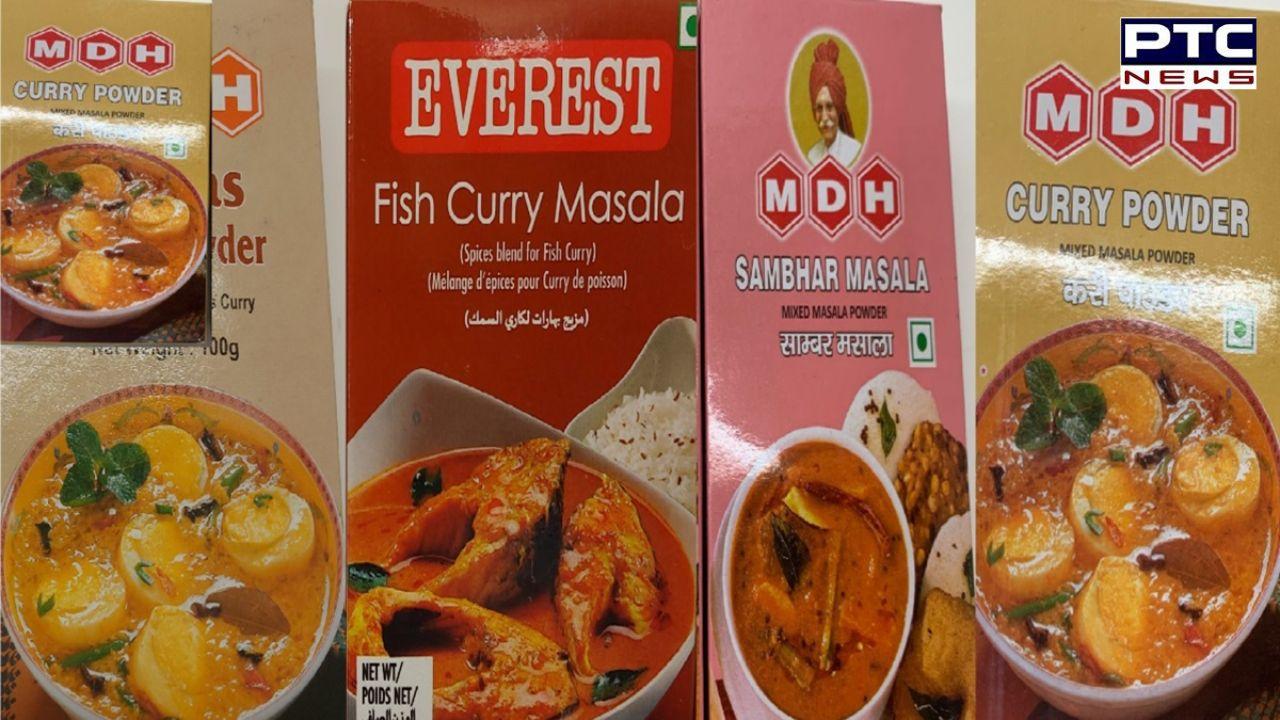- March 31, 2025
- Updated 2:22 am
FSSAI finds no traces of carcinogen ethylene oxide in MDH, Everest spices
New Delhi, May 21: The Food Safety and Standards Authority of India (FSSAI) has stated that no traces of the carcinogen ethylene oxide (EtO) were found in the samples of spices from MDH and Everest facilities across the country. This conclusion comes after comprehensive testing of 300 samples of Indian spices from various manufacturing units, as per a report published in The Tribune.
It comes amid recent recalls of certain batches of MDH and Everest spices by the authorities in Hong Kong, Singapore, and Nepal, citing impermissible levels of EtO, a pesticide classified as a Group 1 carcinogen. Releasing its initial lab findings, FSSAI confirmed that none of the spice samples tested within India contained carcinogen ethylene oxide. However, the possibility of contamination during transport, storage, or handling in other countries was not ruled out.

FSSAI initiated a nationwide inspection drive on April 22, involving all Commissioners of Food Safety from States/UTs and Regional Directors of FSSAI. This action followed media reports on the recalls based on the presence of ethylene oxide exceeding permissible limits in exported spices from Mahashian Di Hatti (MDH) and Everest Food Products.
As part of the drive, nine samples of Everest spices were collected from two manufacturing facilities—one in Maharashtra and one in Gujarat. Additionally, 25 samples of MDH spices were taken from 11 manufacturing units located in Delhi, Haryana, and Rajasthan. These samples were rigorously tested for compliance with various quality and safety parameters.
The testing criteria included quality parameters such as moisture, live and dead insects, insect fragments, rodent contamination, volatile oil content, ash and acid-insoluble ash. On safety parameters front, the samples were checked for heavy metals (lead, cadmium, copper, tin, arsenic, mercury, and methyl mercury), aflatoxins (total aflatoxin and aflatoxin B1), melamine, pesticide residues (230 different pesticides), microbiological factors (yeast and mold count, Enterobacteriaceae, Staphylococcus aureus, aerobic colony count, salmonella, sulphite-reducing clostridia, and Bacillus cereus), and additives (acesulfame potassium, butylated hydroxyanisole (BHA), butylated hydroxytoluene (BHT), tertiary butyl hydroquinone (TBHQ), sorbic acid, sulfites, added colour and coal tar dyes).
The analyses were conducted at NABL-accredited laboratories notified by FSSAI, ensuring adherence to relevant Food Safety and Standards Regulations.
Out of the 34 samples collected, 28 lab reports have been received, with six reports still pending. The received reports, examined by the Scientific Panel at FSSAI, showed no traces of carcinogen ethylene oxide (EtO). Similarly, over 300 samples of spices from other brands, tested across the country, also indicated no presence of EtO.
The scientific panel includes experts from the Spice Board, CSMCRI (Gujarat), Indian Spice Research Institute (Kerala), NIFTEM (Haryana), BARC (Mumbai), CMPAP (Lucknow), DRDO (Assam), ICAR, and the National Research Centre on Grapes (Pune).
In response to these findings, the Spice Board of India has issued guidelines to exporters on the use of EtO as a fumigant for sterilising spices to meet the microbial contamination standards of importing countries.
Recent Posts
- Crown of goddess Kali, gifted by PM Modi, stolen from temple in Bangladesh
- Hezbollah leader survives assassination attempt amid Israeli strikes that kill 22 in Beirut
- ਕ੍ਰਿਕਟ ਦੇ ਬਦਲੇ ਨਿਯਮ, ਹੁਣ ਇਸ ਕੇਸ ‘ਚ ਦੁਬਾਰਾ ਨਹੀਂ ਮਿਲੇਗੀ ਬੈਟਿੰਗ, ਮੰਨਿਆ ਜਾਵੇਗਾ
- ਸਚਿਨ ਤੇਂਦੁਲਕਰ ਦੇ ਬਰਾਬਰ ਪਹੁੰਚੇ ਜੋ ਰੂਟ, ਪਰ ਵਿਰਾਟ ਦੇ ਇਸ ਰਿਕਾਰਡ ਤੋਂ ਅਜੇ ਵੀ ਦੂਰ
- Ratan tata death: ਸਿਰਫ ਵੋਲਟਾਸ ਹੀ ਨਹੀਂ, ਸਵੇਰ ਤੋਂ ਰਾਤ ਤੱਕ ਤੁਹਾਡਾ ਕੰਮ ਟਾਟਾ ਦੇ ਬਿਨਾਂ ਨਹੀਂ ਚੱਲ ਸਕਦਾ
